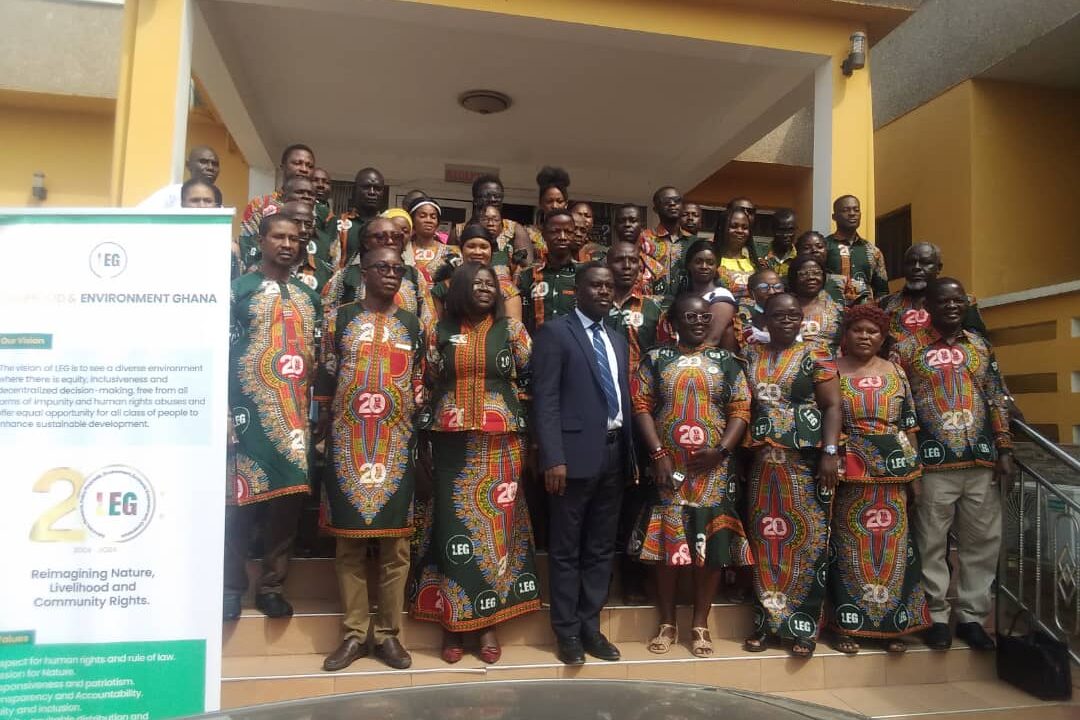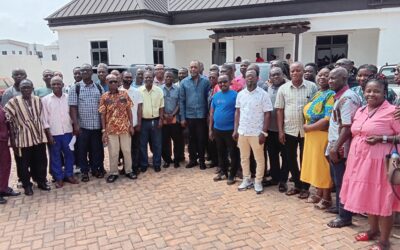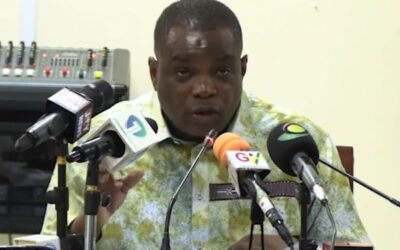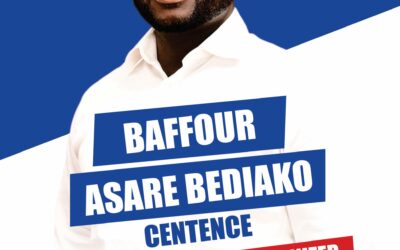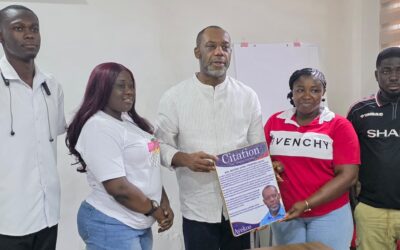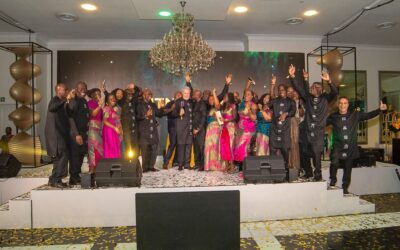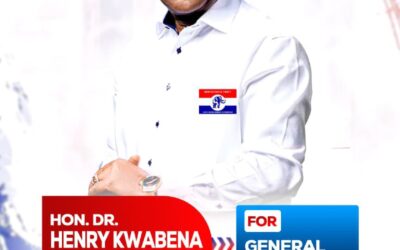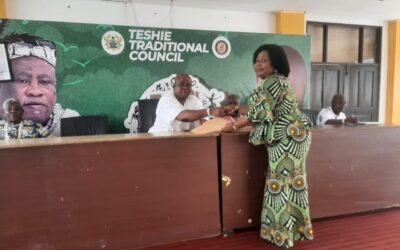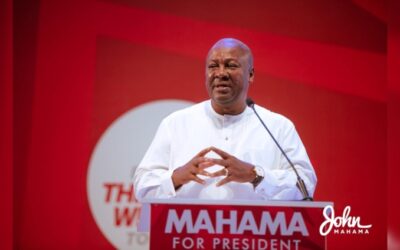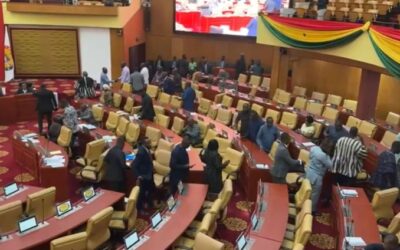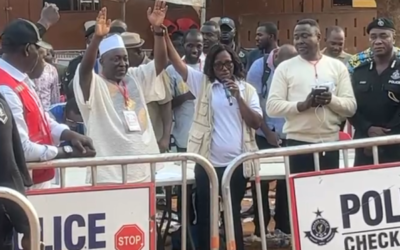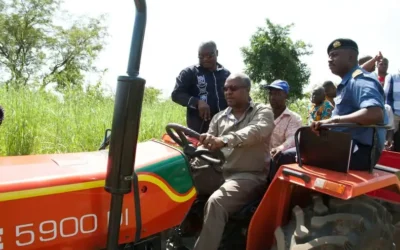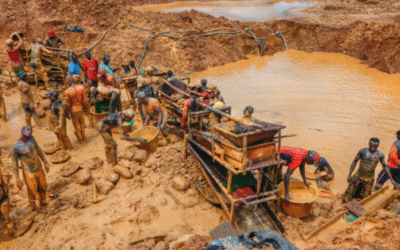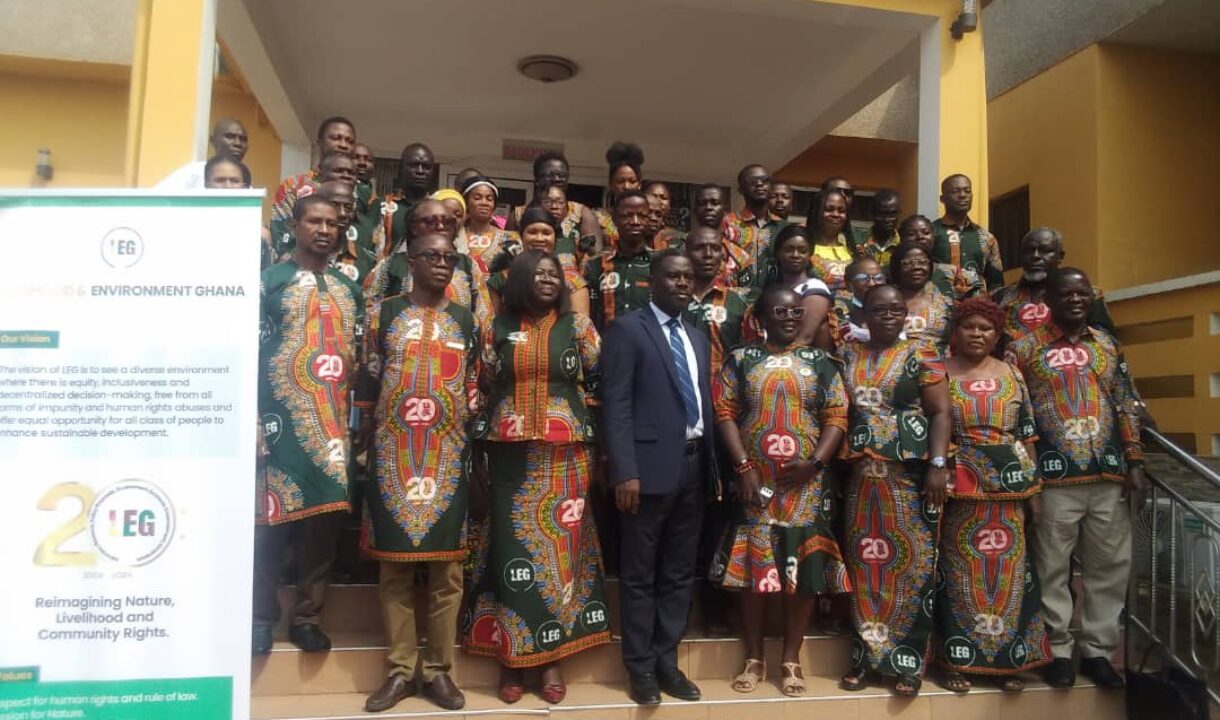By: Isaac Amoah/tntnewspapergh.com
Livelihood Environment Ghana(LEG), a Sunyani-based environmentally inclined Non-governmental Organisation, which is currently operating in over 46 communities in Seven regions,
has held its 20th anniversary celebration and Annual General Meeting(AGM) in Kumasi.


The event was held on Monday,30th December,2024 at Charleva hotel at Adoato-Adumanu in Kumasi,was on the theme “Reimagining nature, Livelihood and Community Rights”.
The vision of LEG is to see a diverse environment where there is equity, inclusiveness and decentralised decision-making,free from all forms of impunity and human rights abuses and offer equal opportunity for all class of people to enhance sustainable development”.
With the mission of empowering women,youth and the marginalized for active citizenship and engagement with policy-makers and duty-bearers to promote sustainable livelihood , environmental justice, community rights and improve minerals governance and policies through, policy proposals and Advocacy to enhance sustainable development”.
In his welcome statement,Mr Richard Adjei-Poku,the Executive director of LEG, recounted that,prior to the formation of LEG, an organization known as Guards of the Earth and the Vulnerable (GEV) was formed in 2001 by (Richard Adjei-Poku) and a group of farmers such as Thomas Oppong, Simobrass, Atta Nsiah, Seth Appiah Agyemang, Thomas Addai, Ataa Brini, Eric Addai the former District Chief Executive of Asutifi North District Assembly and others.
He explained that the cardinal reason for the formation of these organisations was to ensure fair and adequate payment of compensation for crops and other properties which were destroyed by the activities of the mining. GEV was initially known as the Ahafo Concerned Communities Affected by Mining (ACCAM).

The full statement delivered by the Executive director of LEG,Mr.Richard Adjei-Poku at the 20th Anniversary Celebration is reproduced below;

Brief history of LEG
To God be the Glory, Livelihood and Environment Ghana (LEG) is Twenty Years Old. The two decades journey has not been easy; full of experiences and learnings, interesting and monotonous, ups and downs. Thanks, and Glory be to God for how far He has brought.
As many of you may be aware, Ahafo is rich in mineral resources particularly gold as the region lies within the economically viable trending volcanic belts on which many of the largest gold mining companies in Ghana operate. As a result, the area became a destination for transnational mining companies between 1995 and 2001. Many mining companies came to do exploration for gold including BRGM, Centenary, Bonsu Gold Belt, La-Source Mining, Rank Mining, Normandy Ghana Gold among others and finally Newmont came to settle in 2001.
Preceding to the arrival of Newmont, as a staff of Normandy Ghana Gold, I have had a terrible experience from Tarkwa through a sensitization workshop organized by TWN Africa in Kenyasi which I happened to organize the grounds. The experienced workshop changed my perception and interest to work for the company rather than seeking the interest and the welfare of my people particularly the welfare of the farmers whom the workshop revealed as high risk victims because of the nature of the operation as surface gold mining.

Prior to the formation of LEG, an organization known as Guards of the Earth and the Vulnerable (GEV) was formed in 2001 by me (Richard Adjei-Poku) and a group of farmers such as Thomas Oppong, Simobrass, Atta Nsiah, Seth Appiah Agyemang, Thomas Addai, Ataa Brini, Eric Addai the former District Chief Executive of Asutifi North District Assembly and others.
The cardinal reason for the formation of these organisations was to ensure fair and adequate payment of compensation for crops and other properties which were destroyed by the activities of the mining. GEV was initially known as the Ahafo Concerned Communities Affected by Mining (ACCAM). Towards the end of the year 2001, ACCAM was changed to GEV following a revision of their objectives from the narrow compensation issue to include a border advocacy role, environmental sustainability and the protection of the rights and interest of the vulnerable. In 2004, Newmont made an offer to GEV to serve as the community liaison tool.
This offer appeared to undermine the stated objectives and autonomy of GEV. Failure on the part of Mr. Eric Addai, the then Executive Director of GEV and majority of Board members of GEV to recognize the potential risks of the offer led to their acceptance of it from Newmont Ghana Gold Limited. As a result, after the meeting in Accra between Eric Addai, Richard Adjei-Poku and TWN-Africa proved futile, Adjei-Poku decided to break away from GEV and founded LEG in July 2004 with together with Atta Nsiah.

Mr.Richard Adjei-Poku Executive director of LEG
The moral and technical support in the formation of LEG came from Dr. Abdulai Darimani, then Environmental Program’s Officer and employee of the Third Word Network-Africa (TWN-Africa) who later became the Chairman of Board of Directors of LEG between the period of 2017 – 2021.
LEG was formed to deal with the issues left behind by GEV after they had become fragmented with Newmont and to response to other growing social, environmental, livelihood and human rights threats from the company, a US multinational mining corporation.
LEG began with only one community, Kenyasi No.2 without office space. Meetings were held in Asutifi Educational Complex classroom.
The organization with support from Third Word Network-Africa (TWN-Africa) in 2005 conducted what we called “community film shows” using the Prestea and Tarkwa examples. The purpose of the film show was to educate the communities on both the positive and the negative effects of surface gold mining because the then Newmont and the government were preaching solely the good things about mining without the negative aspects.
Mining was a new thing to the people of Ahafo therefore the film show provided them with sufficient and useful information on surface gold mining which helped the communities in most of their decisions with the company.
During the film show, some community members willingly offered themselves to work with the organization as community volunteer. The communities in where the film show took place include Kenyasi No.1, Kenyasi No.2, Ntotroso, Gyedu and Wamahinso all in the Ahafo South project of Newmont in the Asutifi North District. The other communities were Yamfo, Susanso, Tanoso, Afrisipa, Techire, Adrobaa, Bisi, Kromfrom, Subriso and Mosikrom in the Ahafo North project area of Newmont in the Tano North Municipality.
In 2006, the organization with support from TWN-Africa rented office accommodation, conducted election to appoint Board members and other officials including the Executive Director for the first time and acquired a legal status as an NGO through registration with the Registrar General’s Department, Accra on March 23rd, 2007. In that same year that we received our first time Global Greengrants Fund (GGF) grant support which helped furnished the office with the necessary office equipment.
The Board of Directors of the organization with the late Adu Yaw Saliu as the chairman worked till December 2012 before new board members with Dr. Abdulai Darimani as chairman took over in January 2013 – December, 2017, followed by the third Board of Directors with Dr. John Adu Kumi who is now an Associate professor took over from January, 2018 to December, 2021 and succeeded by the current Board with Professor (Mrs.) Mercy Afua Adutwumwaa Derkyi as chair and Dr. Erica MacGranaham as vice chair, the first time two women occupying the positions of Chair and the Vice Chair.
LEG has worked tirelessly through its community advocacy and sensitization programs, capacity building and training sessions, women economic empowerment, afforestation, community rights and litigation, engagement with corporate bodies, duty bearers and policymakers, networking and strengthened media engagements to enhance the living conditions of the poor and the marginalized in its 46 operational communities better and the mother earth a safe place to live.
2.0 The Struggle of LEG
The unsustainable practices of mining over the years have strained the country’s natural ecosystems. Ghana has had to bear the brunt of environmental degradation, from deforestation and pollution to the effects of mining and climate change. The Ahafo, Eastern, Ashanti and Western regions, for instance, have seen significant ecological damage due to large-scale gold mining operations, leading to the destruction of forests, water bodies, and biodiversity.
It is against this background that LEG for the past years has exploited different strategies and tactics for addressing, environmental, mineral governance, livelihood and community rights problems and has learnt to offer solidarity to victims.
As Livelihood & Environment Ghana (LEG) celebrates 20 years of advocacy and achievements, we reflect on our theme for this special milestone: “Reimagining Nature, Livelihood, and Community Rights.” This theme captures the journey we have undertaken and the vision that guides us, a vision for a future where nature flourishes, livelihoods are sustainable, and communities are empowered to actively engage and claim their rights.
Environmental Sustainability
Nature is the foundation of our existence and the bedrock of sustainable development. To achieving environmental sustainability is critical and it is one of goals of the SDGs particularly Goal 6 which aim at getting clean water and sanitation, Goal 11 which envisage sustainable cities and communities, Goal 13 reducing impact of climate change and 14 and 15 wishing good life on water and land.
On environmental sustainability so many strategies have been adopted over the year to achieving sustainable environment for present and generations yet unborn.
Forest – Ghana’s forest cover was approximately 8.4 million hectares around 1909 has depleted little over 7.1 million.
Campaigns, Sensitization forum, radio education, floats etc. E.g. A nation-wide education on “Sustainable use of Ghana’s forest resources” in collaboration with Forestry Services Division with funding support from Womadix Foundation through GGF.
Another example is the 2 afforestation projects (LEG’s Tana Restoration Project and LEG’s Akantansu Restoration Project).
LEG’s Tano Restoration project at Ntotroso I the Ahafo region (LEG, 2009)
The district forest officer handing over the safety boots and cutlass to CFPG member
We establish what we called “Community Forest Protection Guards in every forest fringe communities after the training and give them the fire fighting materials. So the picture you see is one of the training sessions at Konkontreso in the Asutifi South in the Ahafo region.
2.2 Sustainable Livelihood
When asked: “what is a livelihood”, some people would struggle to answer. “Making a living”, “supporting a family”, or “my job” all describe a livelihood. The term is well recognized as humans inherently develop and implement strategies to ensure their survival. The hidden complexity behind the term comes to light when governments, civil society, and external organizations attempt to assist people whose means of making a living is threatened, damaged, or destroyed. From extensive learning and practice, various definitions have emerged that attempt to represent the complex nature of a livelihood.
According to (Stewart Carloni and Crowley, 2005) Livelihoods can be defined as the different types of assets, abilities, and activities that enable a person or household to survive.
For many in Ghana, especially in mining-affected regions, livelihoods have been disrupted by environmental degradation and displacement. Agriculture, which forms the backbone of rural economies, has been significantly affected by the destruction of arable land and water sources.
Reimagining livelihoods involves thinking beyond traditional economic activities. It means diversifying income sources, promoting innovation, and creating opportunities that are both inclusive and environmentally conscious. It also calls for addressing systemic barriers, such as gender inequality and youth unemployment, to ensure that no one is left behind. At its core, reimagining livelihoods is about restoring dignity and hope. It is about ensuring that every individual has the tools and resources to lead a meaningful and productive life, while safeguarding the environment that sustains us all.
Over the past two decades, LEG has championed initiatives that empower marginalized groups, including women, youth, and persons with disabilities. Through skills training, seed funding, and support for alternative income-generating activities and soft loans we have provided opportunities for communities to rebuild and thrive.
In the past nine year we have trained 3,753 people in five mining affected communities (Yamfo, Susuanso, Afrisipakrom, Terchire and Adrobaa) and two non-mining communities (Bogyampa and Sunyani) on different sustainable skills and offered them basic business and financial management principles.
We have supported 2,017 women and 13 men (youth) within Yamfo, Susuanso, Afrisipakrom, Terchire and Sunyani with an amount Ghs 10,200,000.00 as soft loan through our program called “women economic empowerment”. Most of the beneficiaries have either set up of new businesses or expanded their existing businesses. Also, under this module, access to clean water has been made possible in some communities through the provision of mechanized boreholes and we have a good number of testimonies and recommendation from the communities we operate.
See one of the testimonies below from one of the beneficiaries. And note that with the women economic empowerment prpgram with did it in collaboration with TWEDA (Tano Women Empowerment and Development Association).
Vida Karikari, Yamfo – TWEDA and LEG have made tremendous impacts on my life over the years. For instance, the two institutions have financially supported me to see one of my children through the Yamfo College of Health while one of my children has been able to complete senior high school and has recently been recruited into the Ghana Prison Service. Without the financial support by these two organisations, I have my doubts if my children could have come this far. In Yamfo here, this financial support has enabled many parents to cater for their children’s education and there are many of them who can testify to this.
2.3 Community Right Promotion
Community rights are fundamental to social justice and equity. They ensure that communities have the power to participate in decisions affecting their lives, access resources equitably, and live free from harm and exploitation.
Community Rights include Rights of Nature, such as the right of ecosystems to flourish and evolve; environmental rights, such as the right to clean air, pure water, and healthy soil, worker rights, such as the right to living wages and equal pay for equal work and democratic rights, such as the right of local community self-government, and the right to free and fair elections.
However, these rights are often overlooked, particularly in regions affected by industrial activities like mining. Community rights are frequently enshrined in national constitutions or international treaties but rarely upheld in real life. As a result, when development schemes arrive, communities have few means to defend themselves against exploitative projects.
Over the years, LEG has worked tirelessly to champion the rights of our project communities. Through LEG’s interventions, most of these communities have won key legal tussles which appeared unsurmountable hurdles prior to their encounter with LEG.
Example:
Campaigns and education a nation-wide campaign was embarked with the theme: “End Violence against women in mining communities in Ghana with support from Weber Foundation through Global Greengrants Fund (GGF). See Graphic publication and some pictures:
The following persons have been supported:
Sara Matu Ibrahim – we supported her to win a case in court against Pergah transport and Newmont, See the publication of the Sara’s case:
Picture with Richard and Sara Matu from Sunyani High Court room.
- Gyan Kudjo – we supported Gyan Kudjo to received good severance package.
Gyan Cudjoe, a former worker of Vision Quarry – located in Buoku near Wenchi in the Bono region, who was laid off some years ago. My employer was reluctant to pay my severance package in accordance with law. I petitioned the Trades Union Congress (TUC) to intercede on my behalf but to no avail. I heard about LEG when it came to an outreach programme in Buoku, and I took advantage to approach its officials to inform them of my plight. LEG took up the issue and began the process of recovering my money. After a series of engagements between LEG and the company, half of my money was paid to me while the remaining half was advanced to me two weeks later.
What was even more exciting was that the amount of compensation paid to me was more than twice the amount paid to other workers who were also laid off but dealt directly with the company without any assistance by any NGO such as LEG.
4. Chirano, New Obrayeko Saga – we supported New Obreyeko community to receive a good deal in terms of corporate social responsibility from Chirano Gold Mining through dialogue and lobby meetings. See the picture below at one of the dialogue meetings.
Agartha Gyamfua and many more, which time will not permit me to capture all. See the picture and the testimony of Agartha Gyamfuaa.
Agartha Gyamfua, Kenyasi No.2 – About two years ago, my husband ejected my children and I from our matrimonial house and took over all other properties we had acquired together over time. Through LEG, I was able to pursue the case in court and secure victory. The court ruled that one of our two cocoa farms be given to me while our house is to be sold, and the money be shared among us. Additionally, the court awarded Ghs 83,000.00 as compensation and cost of my court expenses.
Conclusion:
In the next ten years ahead, we want to re-strategize and reimagine nature, livelihood and community rights through community level education and empowerment, research and policy advocacy so as to improve nature, promote community rights and enhance sustainable livelihood.
We also want to thank our partners and funders and acknowledgement for their immense support:
TWN – Africa
Oxfam Novib
STAR Ghana Foundation
Global Greengrants Fund (Weber Foundation and Womadix)
ISODEC
We also want to acknowledge and thank individuals and organizations whose names are not mentioned but has contributed one way or others to the success of LEG.

